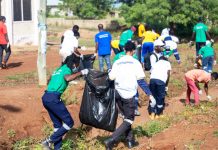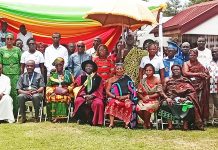Every country or community craves for development in various forms – development that has a positive impact on various facets of human endeavour. This insatiable quest for development calls for pragmatic measures to bring it to fruition.
One tested model that holds the key to rapid socio-economic development at the local level is the Facilitated Collective Action Process (FCAP), a process that was developed and popularized in East Africa by Spark Micro Grants, a partner organization of Advocates for Community Alternatives (ACA).
In fact, Spark Micro Grants has successfully implemented this model in seven countries involving 816 communities with over 550,000 people directly impacted by this initiative.
ACA, a non-profit-making organisation, has since 2016 been helping some West African communities threatened by mining activities to choose a development pathway through legal support and popular mobilization.
In the long-term, the FCAP process envisages that this tried and tested model will be adopted by the government as the main vehicle for the execution of development projects at the local level.
Since 2018, FCAP has been ACA’s community-driven development strategy, which encourages communities in Ghana and some other West African countries to create a common development vision and equips them with skills and financial resources – including a USD 9,000 micro grant–to pursue it.
FCAP typically combines facilitated meetings, community capacity building, savings groups and a micro grant to the community, to impact individual livelihoods and a sense of social cohesion within the whole community.
Beneficiary communities are first trained, among others, in how the people could come together, mobilize resources and take their destiny into their own hands. ACA and the local authorities usually hire Community-Based Facilitators (CBFs) to run the FCAP process on a day-to-day basis in each community.
How FCAP works
The Facilitated Collective Action Process (FCAP)is run under three broad Phases. These are the Planning, Implementation and Post-implementation.
Phase 1: This stage involves effective planning during which community members are first trained, among others, in how they could come together, mobilize resources and take their destiny into their own hands. ACA and the local government authorities usually hire Community-Based Facilitators (CBFs) to run the FCAP process on a day-to-day basis in each village.
Phase 2: This is the implementation stage. At this point, ACA signs grant agreement with each beneficiary community to enable the people implement their chosen project with the $9,000.00 micro-grant within a specified period.
Examples of communities which are currently at this stage are Saamang, Abompe, Dome, Hemang, Nsutam, Dwenase, Bosuso and Kplandey in the Fanteakwa South district as well as Asikam and Ahwenease in Abuakwa South of the Eastern Region of Ghana.
Phase 3: The last Phase of FCAP is the post-implementation stage where the communities are weaned off FCAP and expected to have acquired some skills to implement their own sustainable development projects, going forward.
At this stage, these communities mobilize financial and material resources themselves toward projects in their communities. Donkro Nkwanta, Nwoase, Kyeradeso and Salamkrom in the Nkoranza South municipality, Sagyemase in Abuakwa South as well as Juaso and Nsuapemso in the Fanteakwa South district are communities which are currently at this stage of FCAP.
Success stories
Plans are underway to roll out FCAP in one hundred communities across the Ghana following the successful piloting of the process in four communities in the Nkoranza South Municipality namely Donkro Nkwanta, Kyeradeso, Nwoase and Salamkrom as well as additional three communities in the Eastern Region namely Sagyemase in Abuakwa South and Juaso and Nsuapemso in Fanteakwa South district.
The good news is that each of the seven communities just mentioned above has something concrete to show because of the implementation of FCAP primarily because each of them created a common development vision and was equipped with skills and financial resources to realize it.
For instance, Kyeradeso had no health facility and to avoid the situation where the people of the area travel to nearby communities for medical attention, the community decided to use the $9,000 micro grant to put up a CHPS Compound while Salamkrom constructed a 4-unit nurses’ quarters to accommodate nurses posted to the area.
For the people of Nwoase, their main concern was to have accommodation facility for teachers in the town so that they would not have to commute from neighbouring towns to work daily. To this end, they have constructed a 4-unit Teachers’ Quarters to ensure that teachers in the area have a convenient place to lodge and go about their normal duties.
Donkro-Nkwanta, on the other hand, has constructed a 1,400-seating capacity Community Centre to serve as a suitable place of holding major public and social gatherings such as Town Hall meetings, wedding receptions, funerals and many more.
In the Eastern region town of Juaso, a community still battling with varying devastating effects of mining, the residents are done with a soap-making factory – thanks to FCAP and they have just begun the production of black soap in commercial quantities to generate income for themselves and to boost their local economy.
Their compatriots at Sagyemase and Nsuapemso have successfully put up CHPS Compounds to aid the access to primary health care services in these communities.
Post FCAP implementation stage
It is note-worthy that Donkro Nkwanta, Kyeradeso, Nwoase, Salamkrom, Sagyemase, Juaso and Nsuapemso have recorded tremendous successes after transitioning to the post-implementation Phase of FCAP.
For example, the people of Donkro Nkwanta have successfully organized a fund-raising ceremony in partnership with their compatriots in the diaspora toward the provision of streetlights in the town, construction of a school block, renovation of the Maternity Block of their local Health Centre as well as provision of doors and windows of the Community Centre. The diasporans have so far supported the community with GH¢15,200.00.
A similar story can be told at Sagyemase where, with the support of their colleagues in the diaspora, the community is wiring their CHPS Compound with ease. A Member of Parliament aspirant has also provided financial support toward the tarring of the floor of the CHPS Compound.
At Salamkrom, the people have been able to pool resources toward the construction of a maternity block.
The Kyeradeso community has also undertaken a few self-help initiatives during its post-implementation stage of FCAP. From their own internal mobilization of resources, they have extended pipe-borne water to their clinic and kick-started a nurses’ accommodation project in the town.
Even though, these communities have been weaned off FCAP, that does not mean that ACA is done with them because they will continue to enjoy other support packages through the Citizens’ Committee Network (CiCoNet), Public Interest Lawyering Initiative for West Africa (PILIWA) and the Citizen Science programs.
CiCoNet is ACA’s answer to the threat that its partner communities face from powerful economic interests as it serves as an interface group of concerned citizens who help protect the communities’ development vision.
Through CiCoNet, our communities have won key victories, such as prompting the suspension of a highly polluting mining company’s operating permit and inducing companies to fill abandoned pits that endangered the welfare of children and livestock.
ACA’s Public Interest Lawyering Initiative for West Africa (PILIWA),a regional movement of lawyers driven by social justice, a host of self-motivated and human rights-driven lawyers, serve threatened communities and assist them to fight for their own vision of the future in the face of pressure from powerful political and economic actors.
PILIWA members have resolved to relentlessly fight for justice and sustainable development in eight West African countries namely Côte d’Ivoire, Ghana, Guinea, Liberia, Mali, Niger, Nigeria, Senegal, and Sierra Leone.
Through PILIWA, ACA’s legal team undertakes case-based legal support, in which ACA directly intervenes to represent or otherwise support West African communities facing serious threats to their human rights, natural environment, or land and livelihoods.
ACA’s Citizen Science program is an alternative, independent, participatory and inclusive scientific approach that helps communities detect the likely impact of mining activities through land, water and air.
Going forward
Having successfully run FCAP in Donkro Nkwanta, Nwoase, Kyeradeso, Salamkrom, Juaso, Sagyemase and Nsuapemso, ACA is currently implementing this development model in eight more communities in Fanteakwa South namely Saamang, Abompe, Dome, Hemang, Nsutam, Dwenase, Bosuso, Kplandey as well as Asikam and Ahwenease in Abuakwa South.
Besides, ACA is in the process of scaling it up by roping in additional 20 communities in Nkoranza South and 46 more communities in Abuakwa South and as time goes on a lot more communities in Ghana are expected to be covered to bring this participatory model of development to the doorsteps to people.
By Richard Kofi Boahen
(The writer is a Journalist and a Public Relations Practitioner)









